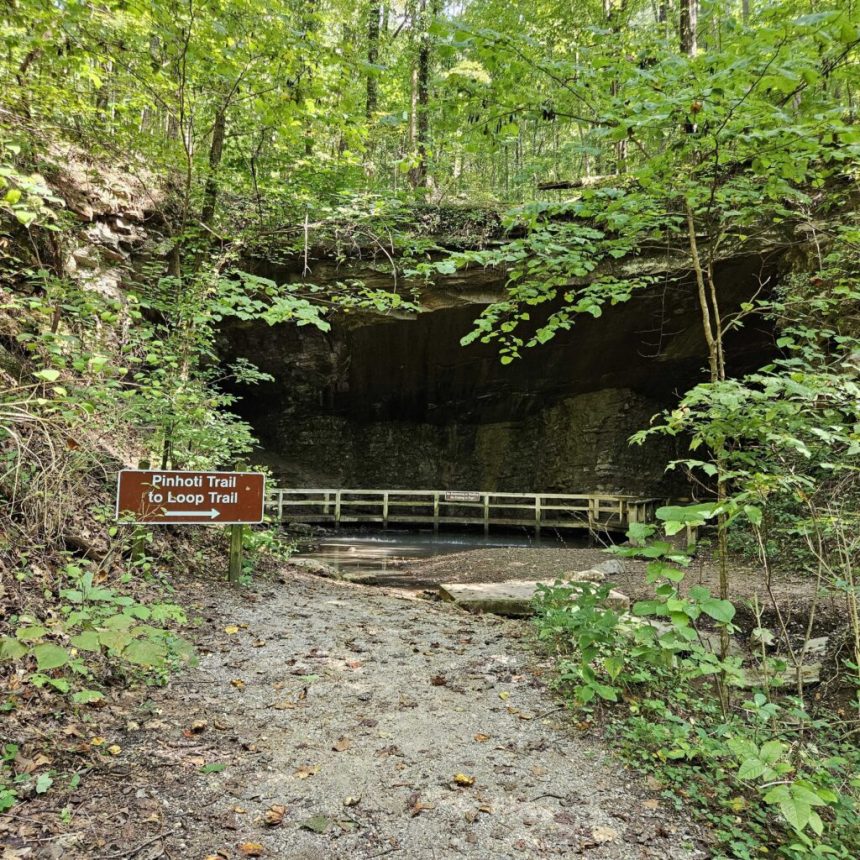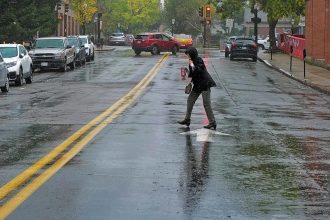James H. “Sloppy” Floyd State Park and other Georgia parks could be getting a little pricier to visit. Photo by Jill Williams
The next time you want to take in some of Georgia’s natural beauty at one of its state parks, it could cost you a little more.
Or at least it will if the Board of Natural Resources signs off next week on a proposal to raise fees. Under the plan under consideration, the cost to park at Georgia’s state parks for a day would double – and plans could also be in the works to introduce a model similar to surge pricing to state park campsites.
The Georgia Department of Natural Resources’ State Parks and Historic Sites Division spent just over $109 million in the 12 months preceding July 1, according to a new report from the state Department of Audits and Accounts, about half of which – $55.5 million – came from self-generated revenue sources like park passes, campsite rentals, golf course fees and gift shop sales.
State funds and bonds pay for about 43% of the division’s expenses, or about $46 million, and the federal government chipped in about $7 million, good for around 7%.
The auditors called the self-generated portion of the division’s revenue “significant.”
“However, we noted additional revenue-generating opportunities related to price adjustments, marketing, and targeted future investments,” the report reads. “Generating revenue to staff and maintain parks must be balanced with ensuring Georgians can access these public resources.”
In all, the auditors came up with more than two dozen recommendations dealing with topics from planning and maintenance to marketing and pricing.
In response to a request for comment, State Parks and Historic Sites Division Chief of Finance Katherine Darsey said the department “recently received the report and will be reviewing its findings and suggestions in the coming weeks.”
You can read the full report here.
Vehicle entry passes
The price to park your car at a state park has been unchanged since 2009 – $5 for a day or $50 for an annual pass, and the auditors found that among southeastern states that charge for park access, Georgia’s fees are the lowest. The report found that Arkansas, Kentucky, Missouri and Tennessee do not charge for daily or annual passes, and Tennessee does not charge for the majority of its state parks.
The state Board of Natural Resources is set to meet Tuesday and vote on increasing next year’s fees to $10 for one visit or $70 for a year, according to the audit report Using 2024 visitation numbers, the auditors found a $10 fee could increase revenue by $3.7 million.
Under the proposed change, groups like senior citizens and disabled veterans who receive discounted rates would see price increases as well, though they would still pay less than the general population.
The auditors also called on the division to push for visitors to opt for annual passes since they bring in more money and drive down the number of potential daily noncompliers.
They note that some states offer discounted annual park passes along with vehicle tag renewal. In one such program in Michigan, 38% of the population purchased discounted passes, generating $42 million.
The auditors found that if owners of 10% of Georgia’s 8.5 million registered vehicles opted for a $20 discounted park pass, state parks could see a $15.8 million revenue bump.
The DNR parks division expressed concerns with the vehicle registration plan, noting fears that such a program could reduce revenues from the state’s license plate program, which allows people to buy a specialty plate and fund conservation efforts.
Accommodations and golf
You may be used to surge pricing when you call an Uber or book a flight, but the practice could soon be coming to a campsite near you.
The auditors recommended the parks division “develop a policy that permits greater variation in pricing based on the season and the demand for individual accommodation sites.”
Georgia’s parks charge different rates based on demand to a limited extent, but the auditors pointed to states like South Carolina and Alabama, which use reservation systems that automatically increase rates based on occupancy.
The auditors gave examples including charging more for cottages during the summer, when demand is high, and less in the winter when occupancy drops. Campers looking for a primo site, like one on the water, should prepare for the possibility of forking over more money as the auditors recommend increasing the variation between campsites based on desirability as well as demand.
The parks division agreed with the auditors’ recommendation to increase pricing variation but noted that “there is a desire to maintain consistency in prices across the system and ensure that the parks are accessible to the public,” according to the report. “As a result, any methodology used to create variation in accommodation pricing should balance revenue maximization with the division’s mission of serving the public good.”
The auditors also recommended fee increases at state park golf courses, including raising the price of annual memberships and boosting the cost of green fees for busier times like weekend mornings to be closer to other public golf courses, as well as instituting no-show fees for golfers who book a tee time but don’t show.
Reactions
Georgia Rivers Executive Director Rena Peck said bringing Georgia parks’ prices more in line with neighboring states makes financial sense and will help fund the work needed to keep facilities attractive and bring in more customers.
“I think it’s a good plan,” she said. “You’ve got to upkeep these places so that people can come, and then it’s a good, positive cycle with outdoor recreation because those state parks and historic sites, most of their budget comes from income from outdoor recreation. So, you’ve got to keep the facilities up in order to keep the stream of money in order to maintain them for people and nature.”
Environment Georgia Director Jennette Gayer also approved of the plan, but said park leaders need to take care not to price Georgians out of the great outdoors.
“Bottom line, we want our parks to be something that Georgians can access and enjoy. We think we all need more nature in our lives,” she said. “So a modest fee increase that is in line with what other states charge is reasonable. As a state park yurt, cottage and campsite user myself, I applaud the recommendation that urges more resources to make sure supply can meet demand, but, again, caution against radical price increases – a campsite or rustic state park cabin should be an affordable and accessible way for Georgians to get away and enjoy nature.”
But Sierra Club legislative chair Mark Woodall said it doesn’t make sense for the state to increase prices at all when it is in a strong fiscal position.
“The state parks of Georgia should be for all the people of Georgia, regardless of income. With over $14 billion in reserve, it would be outrageous for the state parks to increase fees,” he said, referring to the amount of surplus state funds at the start of the fiscal year beginning in July.
“In these difficult times, we ought to be encouraging people to get outdoors, not making it harder,” he added.









